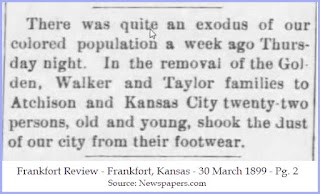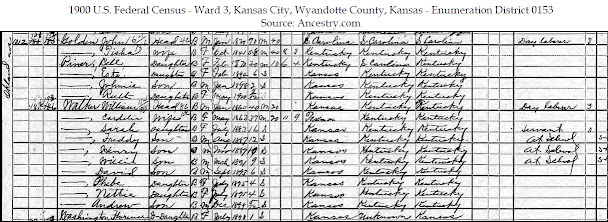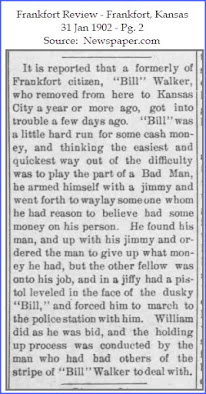The year 1899 saw the death of Winifred Walker. Her husband Isaac died nine years earlier. And now I wondered about that mythical note of condolence written by William Walker listed in those family notes. While it was a nice thought, it was doubtful at best . . . but I decided to poke around and see if I could find anything that might have given rise to that belief. Again, I was astonished to find that not only did it exist, but that it had been published in the Frankfort Review newspaper.
Around the same time, the Walker and Golden families moved to Kansas City . . . as the family notes said they did! Now I thought it might be difficult to follow them, but it turns out that the families always either lived together or next door to each other and between the Federal census, the Kansas State census, and the City Directories for Kansas City I was able to find William and his family. When they left for Kansas City, William and Cordelia had eight children. They settled in at 1012 Oakland Ave. along with her parents and her sister's family. There were 17 people in the one house. The house has been torn down now. I know because I looked for it using Google Maps hoping to help me visualize that many people in one house, but all that is left is an empty lot overgrown with grass and weeds.
A few months later, Cordelia's father, the listed head of the household, died. The American Citizen is a newspaper that served the African American population of Kansas City along with several other newspapers, but the availability of them online is limited. While the 1900 census indicates that they rented the house, later census records state that that John's wife Letitcia Golden, owned the home. She and her extended family, including William and Cordelia, lived there for many years. Tommie arrived in the family about 1904 but sadly died of pneumonia in 1907.
When I found a January 1902 article about William in the Frankfort Review, My reaction was shock, sadness and disbelief. To try and verify it I immediately looked on the Kansas State Historical website because I knew they had prisoner listings for the state prisons. Sadly, I found a William Walker from Wyandotte county who had committed highway robbery in 1901. So it looked like it was true. The only bright spot to this record was that it indicated his record included a mugshot. So assuming it to be William, I sent off for his prison record -- along with a $20 check of course. When it arrived, I tore it open and instantly looked for the mugshot. Now, I paused . . . because I was looking at a big burly black man who claimed he was from Australia and had been sentenced to 20 years but was let out in 1912. My William had his toes frozen off as a child and was supposed to be blind in one eye. This couldn't be him, could it? What are the chances there were two William Walkers from Kansas City who committed highway robbery in the same manner in 1901? I realized that it was possible since there were multiple men named William Walker living in Kansas City at that time. I made a weak effort to find out but discovered little more. After that my research on William went into an extended hibernation.

































